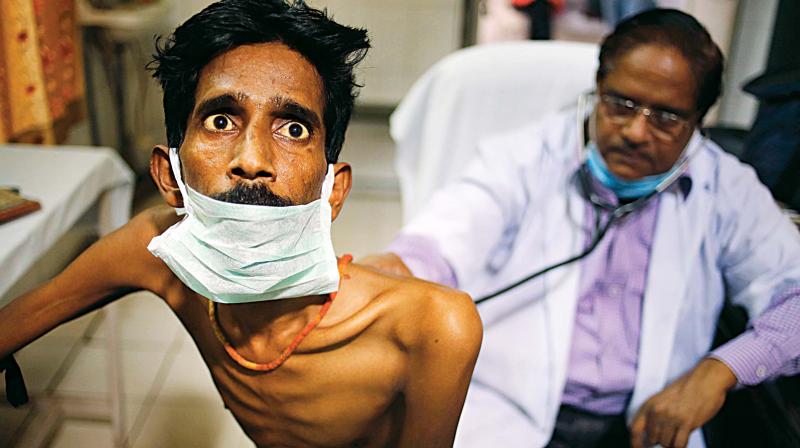World Tuberculosis Day: Eliminating TB an uphill task
In fact, over 60,000 tuberculosis patients have been enrolled from the state in the Revised National TB Control Programme (RNTCP).

Bengaluru: The Kempegowda Institute of Medical Sciences (KIMS) in the city sees some 40 to 60 new tuberculosis patients every month. But it's only one of many hospitals treating a growing number of tuberculosis patients across the state, which has tested some 6,00,000 for the disease. In fact, over 60,000 tuberculosis patients have been enrolled from the state in the Revised National TB Control Programme (RNTCP).
But this number may not tell the full story of the state’s battle with the disease as many TB patients go to private establishments for treatment and may not be counted in the figures the government comes up with. While the national strategic plan is to eliminate TB by 2025, it is not an easy goal to achieve , says doctors.
"This is a good strategic plan, but it will be difficult to eliminate tuberculosis because it is a very ubiquitous bacteria, and is one of the few pathogens that affects every part of the body," explains Dr Savio Pereira, Medical Director of St John's Hospital, adding that treatment is getting increasingly complicated with tuberculosis becoming a co-pathogen in immune deficiency conditions like HIV.
"Considering the existing number and the number that go undiagnosed, the plan of eliminating TB by 2025 is unrealistic.The numbers can only be controlled if all the stakeholders work in unison and there are better diagnostic tools," says Dr Huliraj N, HoD, Pulmonology Medicine, KIMS, adding, "What we need is commitment from the core community and political and administrative support. Today nearly 5 to 7.5 per cent of the population is affected by tuberculosis and of them 2 per cent have Multiple Drug Resistant TB.”
Speaking of the state’s battle against tuberculosis, Dr Raghunandan, joint director of the Revised National Tuberculosis Programme (RNTCP) in Karnataka, says it has rolled out an innovative and visionary electronic recording and reporting system called Nishchay since 2012.
"What we are looking at is rapid decline in TB morbidity, and mortality. Through Nishchay, we are trying to have a public-private-partnership in carrying out proper surveillance,” he explains.
But the best and most simple way to prevent tuberculosis is to keep immunity levels high through a healthy lifestyle, stresses Dr Vivek Anand Padegal, Consultant Pulmonologist, Fortis Hospital, Bannerghatta Road. " Have a healthy diet, stay fit by regular exercise and avoiding smoking," he sums up.
Current Challenges in disease Control
- For every 11 cases notified in public sector, only one case get notified from private sector in Karnataka which is not commensurate to its size and dominance in TB care.
- Lack of adequate awareness in the community on availability of TB diagnostic and treatment facilities in the programme (patient pathway- largely multiple consultations leading to delays)
- Treatment Success rate among drug resistant TB cases are as low as 47%
- A significant proportion of the population is undernourished, which weakens immunity and drives TB reactivation.
- Undetected Infectious TB cases spread disease to their family and community, perpetuating the age-old cycle of transmission and risk.
- In the urban areas, however, there is no established health structure owing to the slow progress of the National Health Mission in the urban areas. The lack of effective partnerships with the private sector too adversely impacts the control efforts in the urban areas.
State beefs up diagnostic, treatment services
- Approximately 6 lakh people have been tested, more than 60,000 TB patients detected and treated during 2016 and lacks of of lives saved by the RNTCP’s efforts
- State has achieved complete geographical coverage for diagnostic and treatment services for multi-drug resistant TB (MDR-TB) in 2013, approximately 3724 persons with MDR-TB diagnosed and put on treatment till 2016.
- The RNTCP and KSAPS have made HIV-TB collaboration efficient and effective; most TB patients registered by RNTCP receive HIV screening (>95%), and now 95% of HIV-infected TB patients receive antiretroviral treatment (ART).
- State has undertaken preparations on war footing to ensure implementation of different components of Revised Technical and Operation Guidelines from April 1 including revised recording and reporting, daily regimen.
- 11,362 private health establishments are registered in NIKSHAY and 15600 cases have been notified form them till now.
- These efforts were supplemented by ‘Standards for TB Care in India’, jointly developed by GOI and WHO to promote right diagnosis and treatment practices in both public and private sector.

